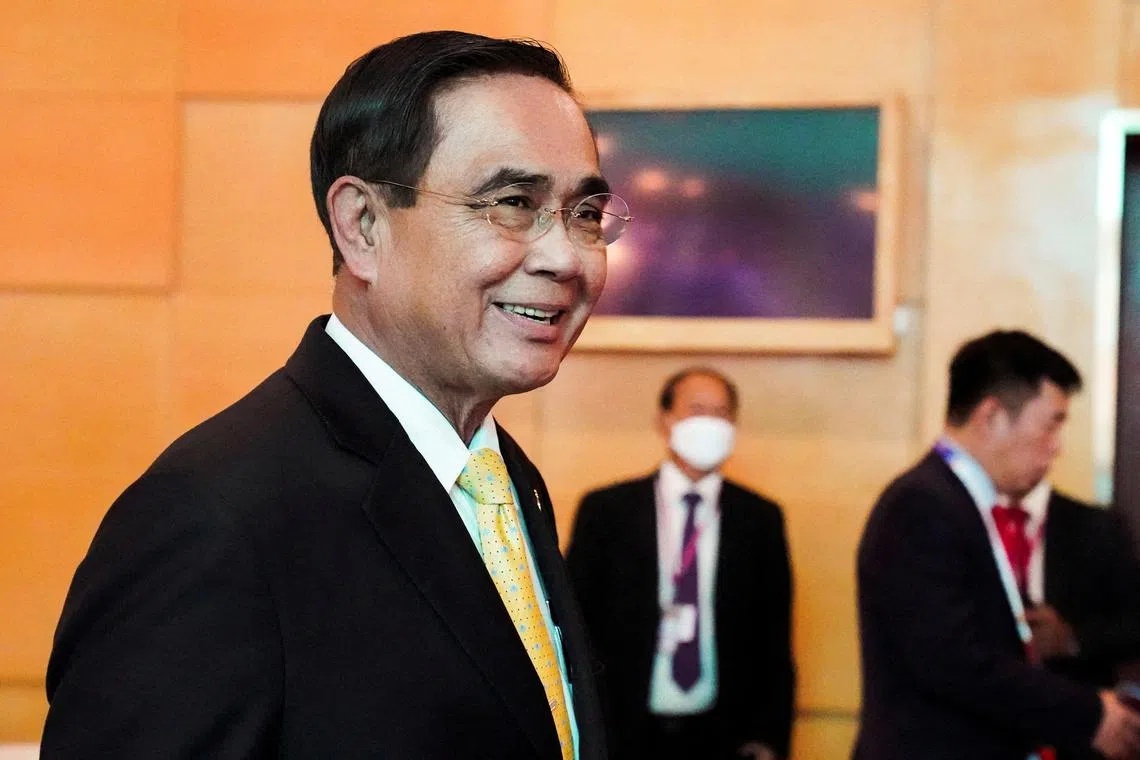Thai PM Prayut deserts ruling party, seeks re-election bid with group run by supporters
Sign up now: Get insights on Asia's fast-moving developments

Thai PM Prayut Chan-o-cha has decided to join the newly created United Thai Nation Party.
PHOTO: REUTERS
BANGKOK Thai Prime Minister Prayut Chan-o-cha on Friday announced that he will be pursuing another term under the banner of the Ruam Thai Sang Chart (RTSC) party, a move that could divide the pro-military and conservative bases in the next election.
After playing coy for weeks, the embattled Premier finally confirmed his departure from the ruling Palang Pracharath Party (PPRP), which had successfully backed him for the premiership in the 2019 General Election.
“I have been considering this for a while, and I have finally decided to join the Ruam Thai Sang Chart party,” he said, adding that the party has offered to support his bid to return as premier in the election that must be held by May 2023.
To give him a chance at re-election, RTSC must win at least 25 MP seats in the election for its nominated PM candidate to be on the ballot. Parliament will then vote for the premier.
Mr Prayut’s move had been imminent, given the widening rift between the former coup leader and PPRP leader Prawit Wongsuwan. The two military men were once seen as close allies, but political differences have driven a wedge between them. However, Mr Prayut insists that their ties remain strong.
RTSC was set up in 2021, purportedly as a vehicle to support his re-election bid. Its leader Pirapan Salirathavibhaga was recently appointed as secretary-general of the Prime Minister’s Office.
With Mr Prayut’s move to RTSC, several MPs from other parties, including the PPRP, are expected to follow suit in the next few weeks, said analysts.
According to the law, candidates must be part of a party for at least 90 days before contesting the election.
Political scientist Napon Jatusripitak said: “We will have to pay close attention to who joins the RTSC. This will give us an idea of Prayut’s gravitational pull.”
He added that the former army chief still enjoys some support from conservative voters and has a base in Bangkok and down south.
Other parties, like the Bhumjaithai Party, have successfully drawn dozens of defecting politicians into their ranks. But there is also speculation that Mr Prayut has been working to shore up support from a group of “A-list” MPs who could join RTSC, reported The Bangkok Post.
“If (RTSC) is able to draw in political heavyweights and prominent MPs, this could boost their chances,” said Dr Napon, a visiting fellow at Singapore’s ISEAS – Yusof Ishak Institute.
Conversely, if very few MPs join RTSC, it will signal the lack of prospects for the party and Mr Prayut, said Dr Khemthong Tonsakulrungruang, a political analyst from Chulalongkorn University. He feels that this outcome is more likely.
Mr Prayut’s decision could split the pro-military factions between RTSC and PPRP, said Dr Napon, noting that it will be interesting to see how the military-backed institutions, like the Senate, will divvy up support for the two groups.
“But then who is to say that the RTSC and the PPRP won’t shake hands later on to form a coalition,” added Dr Napon.
Dr Khemthong believes that Mr Prayut’s appointment as premier in 2019 was largely a result of the backing provided by Mr Prawit, a seasoned and influential politician. Mr Prawit is likely to be PPRP’s sole candidate for PM in the coming vote.
“The mechanisms that worked in Prayut’s favour were mainly the work of Prawit. With that gone, it will be hard for Prayut... People are saying that the move is a bad bet,” he said.
And even if RTSC scores enough seats and leverage for Mr Prayut to return as premier, another challenge remains.
Legally, a premier’s term limit is capped at eight years. In September, a court ruling determined that there are only two years left on his tenure if he returns to office in 2023.
Mr Prayut had earlier said he hopes to serve for two more years, and would find a suitable successor to complete the full four-year term.
But there is no indication of who his successor will be, and neither is it clear how he will be elected for the role, said Dr Napon.
“It is a dangerous move for the regime. Prayut can only serve until 2025, and anything could happen after that,” he added.



